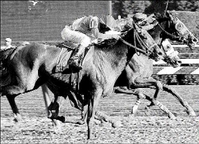Teen gambling on the increase
Published: Sunday | September 20, 2009

TEEN GAMBLERS in Jamaica are growing in numbers and their indulgence is now a matter for concern, research has shown.
A study conducted by the Kingston-based Rise Life Management Limited in 2007, through funding by the Betting, Gaming and Lotteries Commission of Jamaica, found that one out of every five adolescents in Jamaica is either a problem gambler or is at risk of becoming one.
The research was conducted among a total of 1,559 males and 740 females within the 10-19 age group taken from across the country.
problem gamblers
Levels of problem gambling within the sample were calculated using the South Oaks Gambling Screen (SOGS). Using the method, it was discovered that a total of 10.7 per cent of the sample was found to be problem gamblers, with an additional 9.6 per cent being classified as at risk of problem gambling.
Gambling, defined by the researchers as games played for money, was found to be pervasive in the society and virtually all youth 10-19 years were aware of the practice.
Of the sample, just over two-thirds (68 per cent) reported having been exposed to such games, more than half (52 per cent) actually had the opportunity to play, and the majority availed themselves of this opportunity, resulting in 45 per cent of the sample having actually gambled at some stage. Having once gambled, the majority continue gambling and more than two-thirds (67.1 per cent) of this subgroup were identified as current gamblers, having played a game for money in the last 12 months.
10-19 year olds
The study also found that 10-19-year-old youths spent heaviest at gaming establishments and on horse racing, reporting an average outlay of approximately $900 per person. The maximum amount spent at gaming establishments was $13,400, while a maximum of $10,000 was spent on horse racing.
"Games were played for money weekly, from as often as every day to once or twice a week. Poker, gambling on the Internet and coin games were played every day or almost every day, while Jacks, money football, dominoes and 'lastic' were a few of the games played once or twice a week," according to the study.
It added: "This high awareness and exposure to gambling is not surprising, as opportunities to gamble were reported as being at all the central places in his/her life, whether at home, at school or on the street."
meaningful participation
The research further asserted that school connectedness and the presence of the external developmental assets of caring relationships, high expectations and opportunities for meaningful participation within the school environment emerged as factors which protect against the initiation of gambling in youth.
It said: "Youth who felt connected to schools and thus existed in a school environment rich in caring relationships, high expectations and opportunities for meaningful participation, were significantly less likely to engage in any gambling activity."
Researchers suggested that further work needed to be done to better understand the link between informal childhood games and problem gambling.
They purported that intervention was needed to begin changing attitudes towards gambling by first enabling youth to accurately recognise playing even games for money as 'gambling' rather than reserving this title for the more established and higher stakes games. Programmes should seek to strengthen the link between youth and school as this proved to be the most significant protective factor.
"Intervention should promote other avenues for fun and excitement, which could act as alternatives to playing games for money."
athaliah.reynolds@gleanerjm.com







